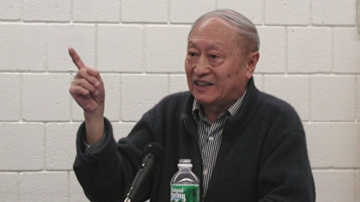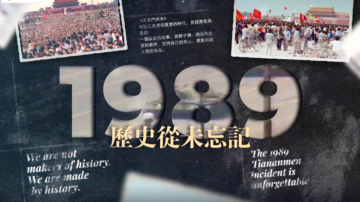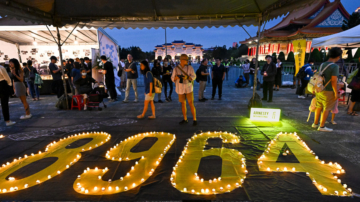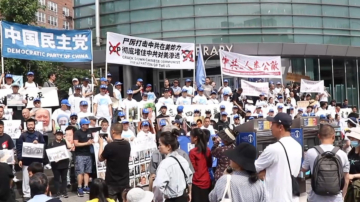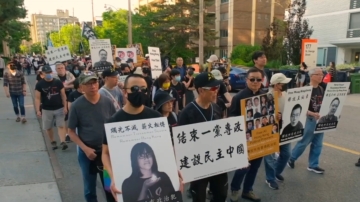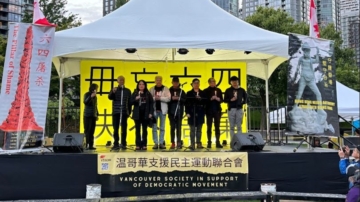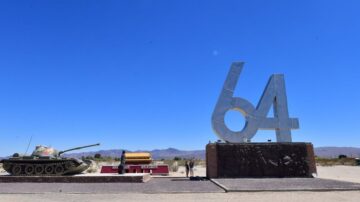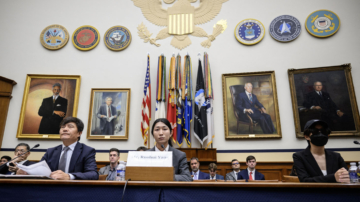【新唐人2013年06月07日訊】1989年「六四屠城」時擔任北京市長的陳希同,在6月2號病逝北京,中共官媒拖延了三天才證實這一消息。而香港的《中通社》,以及《美聯社》卻在「六四」當天就報導了陳希同的死訊。中國觀察人士認為,中共的隱瞞,是不希望大陸民眾從陳希同身上,回憶起「六四」以及這場血腥鎮壓背後的黑手。
6月5號,中共喉舌《新華社》發佈了一條極為簡短的消息,標題只有5個字:「陳希同病亡」,全文也只有57個字,沒有陳希同簡歷,也沒有提及陳希同生前的職務。
外界猜測,可能因為陳希同身份敏感,加上恰逢「六四」24週年前夕,中共不希望人們從陳希同身上聯想到更多關於「六四」的問題,所以陳希同的死訊才受到「冷處理」。
前中共總書記趙紫陽智囊姚監復:「我想它不想在六四之前報導,所以改在6月5號報導,因為這是個敏感日子,他們在六四這一天都很緊張,包括外國記者去萬安公墓,裡面都是警衛森嚴。所以它不希望在六四這一天,發生更多群體性的紀念儀式,或者是作為一個新的、誘發大家集會的焦點問題、熱點問題。」
陳希同病逝在「六四」的前兩天,被外界認為頗有「諷刺性」,八九民運人士和「六四」受難者家屬則認為,這是「天意」。因為陳希同多年來一直被稱為「六四元兇」,是鎮壓89年學生運動及戒嚴的總指揮。
在前中共總書記趙紫陽智囊姚監復執筆的《陳希同親述:眾口鑠金難鑠真》的回憶錄中,陳希同多次否認他是戒嚴行動的總指揮。姚監復則認為,陳希同的辯解,是想減輕罪責,但也是事實。
姚監復:「把陳希同推到第一線,《李鵬日記》說,他是北京戒嚴指揮部正指揮,我覺得這是個煙霧彈,是掩飾20萬正規軍隊,從五個軍區調到北京的這麼一個大的軍事行動,實際上相當於一次小規模戰爭動員的兵力,這麼一場軍事行動的正指揮,怎麼可能是陳希同這麼一個北京大學中國文學系畢業的文官呢? 」
姚監復還指出,《李鵬日記》中曾說,1989年前幾年,中共元老李先念、陳雲、鄧小平等,就在上海研究扳倒趙紫陽,說明鎮壓「六四」的行動,背後其實是一場武裝政變。
姚監復:「這本身是,我覺得是一個陰謀,就是掩蓋六四是一場有計劃、有組織、有領導、有綱領的,反改革的武裝政變這個實質。用北京市長在前面,好像他謊報軍情,定了性質,然後再調軍隊來鎮壓,這樣的話,就把20萬大軍調北京來的軍事行動,變成北京市局部地區有點動亂,然後為了平息騷亂,這個本身是一個假象,讓陳希同在前面是個假象。」
北京民運人士查建國向《自由亞洲電臺》表示,陳希同對「六四血案肯定是有責任的,只是責任大小,具體細節性的東西民眾無法得知,但一般百姓認為,決策者是鄧小平、最壞的是李鵬,陳希同作為北京最高行政長官難逃其責。
對於1998年7月,陳希同因貪污罪、怠忽職守罪,被判處有期徒刑16年,觀察家們普遍認為,那是因為他與中共黨魁江澤民內鬥失敗的結果。
大陸作家鐵流:「北京市都知道陳希同就是個政治犧牲品,也是個體制的悲劇,通過陳希同這個事情,如果這個體制不改變,堅持一黨專政,高官都保不住他自己。」
姚監復說,所有犯下過「反人類罪行」的劊子手,必將有一天受到公正、公開、正義的審判,只有這樣,死難者的靈魂才會得到安息。
採訪/易如 編輯/張天宇 後製/肖顏
Chen Xitong Coincidentally Passed Away Before “June 4”
Mayor of Beijing during the 1989 'June 4th Massacre,'
Chen Xitong died on June 2 in Beijing.
The Chinese Communist Party (CCP) official media
confirmed this news three days after his death.
Hong Kong's China News Agency and The Associated Press
reported the death of Chen Xitong on June 4th.
Chinese observers say the CCP delayed the reporting
for fear Chinese people would, from his death,
recall the black hands behind the bloody repression.
On June 5, CCP mouthpiece Xinhua News Agency
released a brief message with only five words in the title:
“Chen Xitong Died of Illness.”
The text is only 57 characters long, mentioning neither
Chen Xitong's resume, nor his past positions.
Outside speculation is that the CCP doesn't want people
to recall “June 4th” on the eve of the incident's 24th anniversary.
So Chen's close connection to the incident was likely the cause
for his death being given the cold treatment.
Former CCP General Secretary Zhao Ziyang's think tank
Yao Jianfu: “I think the CCP reported the news ‘of Chen's
death’ on June 5 because June 4th is a sensitive da.
They are very nervous on June 4th.
Foreign reporters went to the Wan An Cemetery and
found out it was tightly guarded.
The government does not want any mass memorial ceremony
on June 4th, since it might lead to rallies and more issues.”
Chen Xitong died two days before “June 4th,”
and many people think it is quite ironic.
Pro-democracy activists and families of
“June 4th” victims argue that this is heaven's will.
Chen Xitong is known as the “June 4th Butcher,”
who was claimed to be the general commander of the repression
of the student movement in 1989, and the martial law.
In Yao Jianfu's book “Conversations with Chen Xitong”
Chen denied years of accusations that
he played a key role in organizing the military assault
on the protesters.
Yao believes that while Chen's denial was
to shirk responsibility, he was right.
Yao Jianfu: “Chen Xitong had been pushed to the front line.
Li Peng's Diary says that Chen Xitong was the
commander of the martial law in Beijing.
I think this is a smokescreen to cover up the military
operation of moving a regular army of 200,000 from five military regions to Beijing.
Such a large military operation is in fact equivalent
to a small-scale troop mobilization for war.
How could it have been led by Chen, who graduated from
the Chinese literature Department at Beijing University?”
Yao Jianfu also noted that Li Peng's Diary says CCP veterans
Li Xiannian, Chen Yun and Deng Xiaoping, etc. discussed how
to overthrow Zhao Ziyang in Shanghai several years before 1989,
indicating the "June 4th" repression was actually an armed coup.
Yao Jianfu: “I think it's a tactic for trying to cover up that
the June 4th Massacre was a planned, organized,
and guided armed coup against reform.
They try to push the former Beijing mayor in front
to make people think that he is to blame for the massacre.
They sent military on the scene to crackdown on the protest.
And when the 200,000 troops were moved to Beijing,
the incident seemed like some areas of Beijing had riots,
and military used it as an excuse to act.
This was done to created the illusion that Chen was in the front.”
Beijing pro-democracy activist Zha Jianguo told
Radio Free Asia that Chen is for sure responsible for the “June 4th Massacre.”
As for the extent, people don't have the details.
People generally think that it was decided by Deng Xiaoping.
As Beijing's Chief Executive, Chen can' shed responsibility.
Regarding Chen Xitong's sentencing to 16 years of
imprisonment for corruption and dereliction in July 1998,
observers believe it was due to his losing an
internal struggle with former CCP leader Jiang Zemin.
Chinese writer Tie Liu: “Everyone in Beijing knows Chen is
a political victim, and this is the tragedy‘of the CCP’ system.
If the one-party dictatorship system does not change,
high-level officials can't even hold their positions."
Yao Jianfu said that all killers who've committed “crimes
against humanity”will be brought to fair and open trials.
Only then will the victims' soul rest in peace.
6月5號,中共喉舌《新華社》發佈了一條極為簡短的消息,標題只有5個字:「陳希同病亡」,全文也只有57個字,沒有陳希同簡歷,也沒有提及陳希同生前的職務。
外界猜測,可能因為陳希同身份敏感,加上恰逢「六四」24週年前夕,中共不希望人們從陳希同身上聯想到更多關於「六四」的問題,所以陳希同的死訊才受到「冷處理」。
前中共總書記趙紫陽智囊姚監復:「我想它不想在六四之前報導,所以改在6月5號報導,因為這是個敏感日子,他們在六四這一天都很緊張,包括外國記者去萬安公墓,裡面都是警衛森嚴。所以它不希望在六四這一天,發生更多群體性的紀念儀式,或者是作為一個新的、誘發大家集會的焦點問題、熱點問題。」
陳希同病逝在「六四」的前兩天,被外界認為頗有「諷刺性」,八九民運人士和「六四」受難者家屬則認為,這是「天意」。因為陳希同多年來一直被稱為「六四元兇」,是鎮壓89年學生運動及戒嚴的總指揮。
在前中共總書記趙紫陽智囊姚監復執筆的《陳希同親述:眾口鑠金難鑠真》的回憶錄中,陳希同多次否認他是戒嚴行動的總指揮。姚監復則認為,陳希同的辯解,是想減輕罪責,但也是事實。
姚監復:「把陳希同推到第一線,《李鵬日記》說,他是北京戒嚴指揮部正指揮,我覺得這是個煙霧彈,是掩飾20萬正規軍隊,從五個軍區調到北京的這麼一個大的軍事行動,實際上相當於一次小規模戰爭動員的兵力,這麼一場軍事行動的正指揮,怎麼可能是陳希同這麼一個北京大學中國文學系畢業的文官呢? 」
姚監復還指出,《李鵬日記》中曾說,1989年前幾年,中共元老李先念、陳雲、鄧小平等,就在上海研究扳倒趙紫陽,說明鎮壓「六四」的行動,背後其實是一場武裝政變。
姚監復:「這本身是,我覺得是一個陰謀,就是掩蓋六四是一場有計劃、有組織、有領導、有綱領的,反改革的武裝政變這個實質。用北京市長在前面,好像他謊報軍情,定了性質,然後再調軍隊來鎮壓,這樣的話,就把20萬大軍調北京來的軍事行動,變成北京市局部地區有點動亂,然後為了平息騷亂,這個本身是一個假象,讓陳希同在前面是個假象。」
北京民運人士查建國向《自由亞洲電臺》表示,陳希同對「六四血案肯定是有責任的,只是責任大小,具體細節性的東西民眾無法得知,但一般百姓認為,決策者是鄧小平、最壞的是李鵬,陳希同作為北京最高行政長官難逃其責。
對於1998年7月,陳希同因貪污罪、怠忽職守罪,被判處有期徒刑16年,觀察家們普遍認為,那是因為他與中共黨魁江澤民內鬥失敗的結果。
大陸作家鐵流:「北京市都知道陳希同就是個政治犧牲品,也是個體制的悲劇,通過陳希同這個事情,如果這個體制不改變,堅持一黨專政,高官都保不住他自己。」
姚監復說,所有犯下過「反人類罪行」的劊子手,必將有一天受到公正、公開、正義的審判,只有這樣,死難者的靈魂才會得到安息。
採訪/易如 編輯/張天宇 後製/肖顏
Chen Xitong Coincidentally Passed Away Before “June 4”
Mayor of Beijing during the 1989 'June 4th Massacre,'
Chen Xitong died on June 2 in Beijing.
The Chinese Communist Party (CCP) official media
confirmed this news three days after his death.
Hong Kong's China News Agency and The Associated Press
reported the death of Chen Xitong on June 4th.
Chinese observers say the CCP delayed the reporting
for fear Chinese people would, from his death,
recall the black hands behind the bloody repression.
On June 5, CCP mouthpiece Xinhua News Agency
released a brief message with only five words in the title:
“Chen Xitong Died of Illness.”
The text is only 57 characters long, mentioning neither
Chen Xitong's resume, nor his past positions.
Outside speculation is that the CCP doesn't want people
to recall “June 4th” on the eve of the incident's 24th anniversary.
So Chen's close connection to the incident was likely the cause
for his death being given the cold treatment.
Former CCP General Secretary Zhao Ziyang's think tank
Yao Jianfu: “I think the CCP reported the news ‘of Chen's
death’ on June 5 because June 4th is a sensitive da.
They are very nervous on June 4th.
Foreign reporters went to the Wan An Cemetery and
found out it was tightly guarded.
The government does not want any mass memorial ceremony
on June 4th, since it might lead to rallies and more issues.”
Chen Xitong died two days before “June 4th,”
and many people think it is quite ironic.
Pro-democracy activists and families of
“June 4th” victims argue that this is heaven's will.
Chen Xitong is known as the “June 4th Butcher,”
who was claimed to be the general commander of the repression
of the student movement in 1989, and the martial law.
In Yao Jianfu's book “Conversations with Chen Xitong”
Chen denied years of accusations that
he played a key role in organizing the military assault
on the protesters.
Yao believes that while Chen's denial was
to shirk responsibility, he was right.
Yao Jianfu: “Chen Xitong had been pushed to the front line.
Li Peng's Diary says that Chen Xitong was the
commander of the martial law in Beijing.
I think this is a smokescreen to cover up the military
operation of moving a regular army of 200,000 from five military regions to Beijing.
Such a large military operation is in fact equivalent
to a small-scale troop mobilization for war.
How could it have been led by Chen, who graduated from
the Chinese literature Department at Beijing University?”
Yao Jianfu also noted that Li Peng's Diary says CCP veterans
Li Xiannian, Chen Yun and Deng Xiaoping, etc. discussed how
to overthrow Zhao Ziyang in Shanghai several years before 1989,
indicating the "June 4th" repression was actually an armed coup.
Yao Jianfu: “I think it's a tactic for trying to cover up that
the June 4th Massacre was a planned, organized,
and guided armed coup against reform.
They try to push the former Beijing mayor in front
to make people think that he is to blame for the massacre.
They sent military on the scene to crackdown on the protest.
And when the 200,000 troops were moved to Beijing,
the incident seemed like some areas of Beijing had riots,
and military used it as an excuse to act.
This was done to created the illusion that Chen was in the front.”
Beijing pro-democracy activist Zha Jianguo told
Radio Free Asia that Chen is for sure responsible for the “June 4th Massacre.”
As for the extent, people don't have the details.
People generally think that it was decided by Deng Xiaoping.
As Beijing's Chief Executive, Chen can' shed responsibility.
Regarding Chen Xitong's sentencing to 16 years of
imprisonment for corruption and dereliction in July 1998,
observers believe it was due to his losing an
internal struggle with former CCP leader Jiang Zemin.
Chinese writer Tie Liu: “Everyone in Beijing knows Chen is
a political victim, and this is the tragedy‘of the CCP’ system.
If the one-party dictatorship system does not change,
high-level officials can't even hold their positions."
Yao Jianfu said that all killers who've committed “crimes
against humanity”will be brought to fair and open trials.
Only then will the victims' soul rest in peace.

